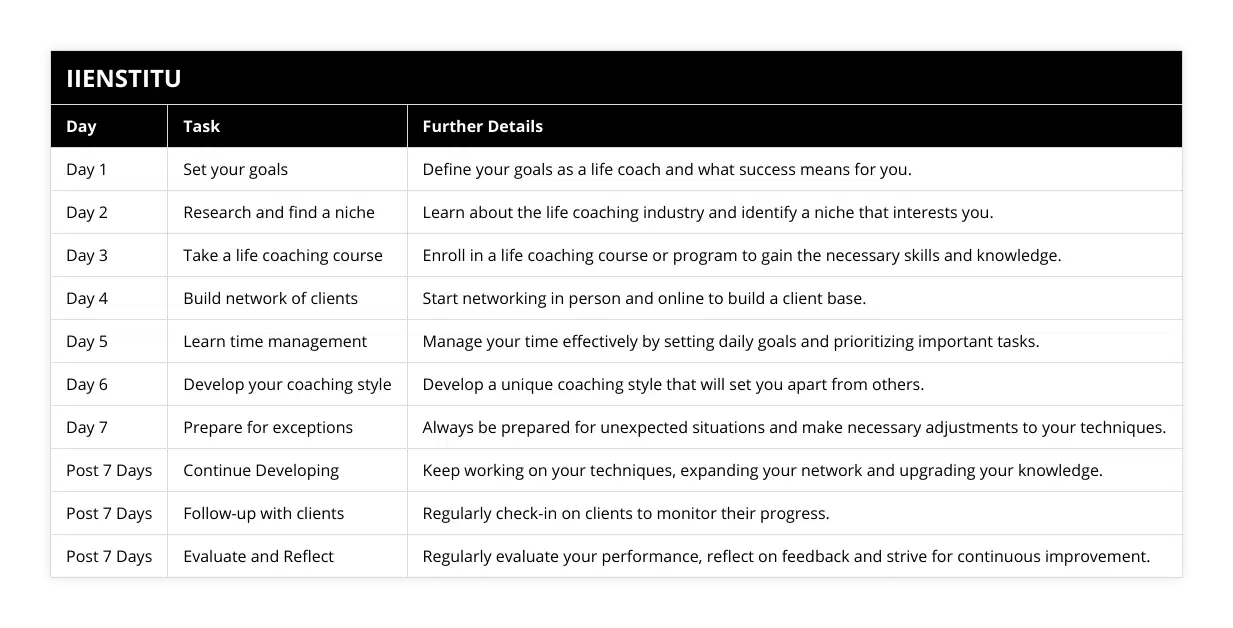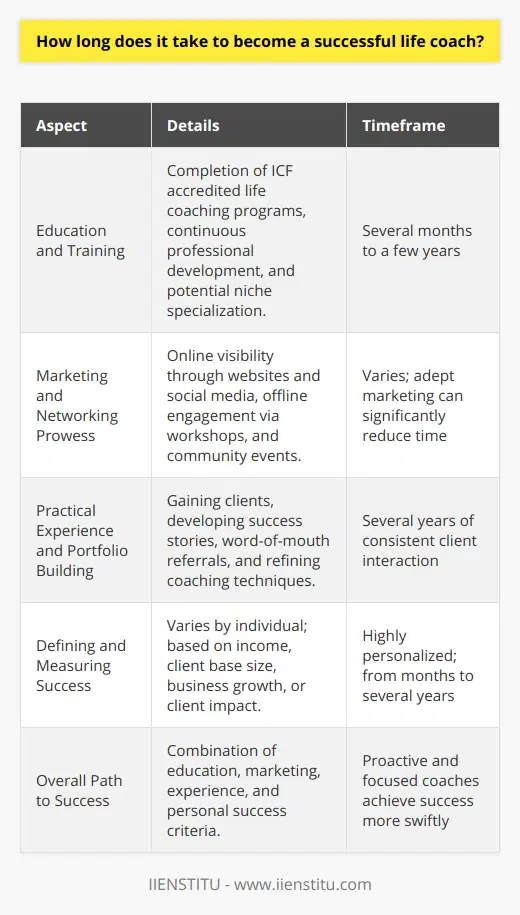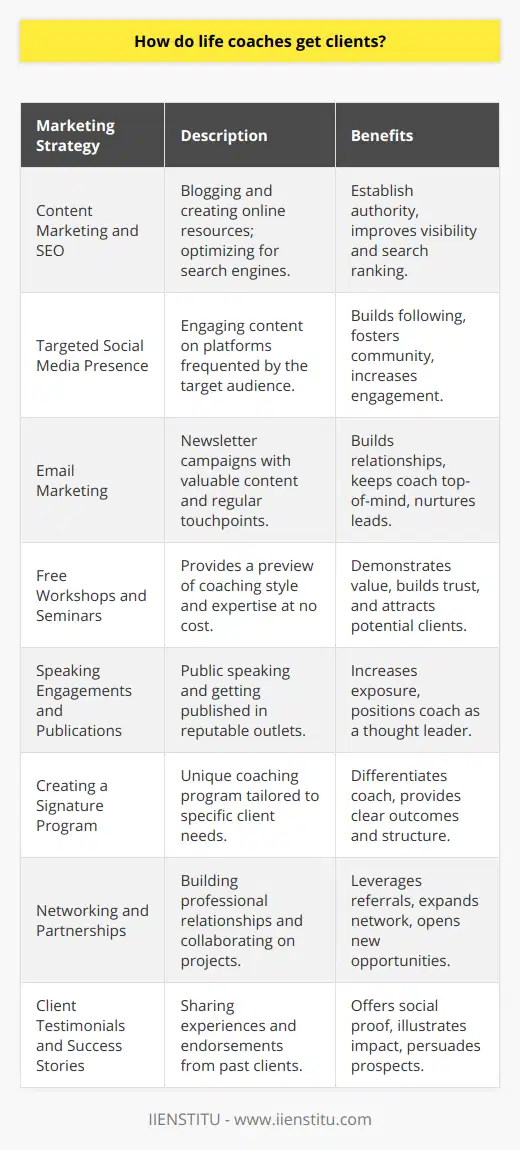
Embarking on a Life Coaching Journey: A Personal Exploration
When I first decided to venture into the world of life coaching, I encountered a whirlwind of doubt and excitement. Like many others, I sought ways to make authentic connections and fuel my passion for helping others grow. If you share my dream of being a successful life coach, there are foundational steps you can follow to prepare yourself for this deeply fulfilling journey. Lean in, and let me share how you can make meaningful strides towards becoming a life coach in just seven days.
Day 1: Setting Goals and Defining Success
On the first day of this crucial week, the focus is inward—the foundation of any successful venture begins here. You ask yourself, "What does success look like to me personally?" By clearly identifying your ambitions, you set the stage for future success. At this point in my journey, I sat down one morning with a hot cup of tea, and simply asked myself what my long-term goals as a life coach would be. Did I wish to cultivate meaningful one-on-one relationships, or engage with communities through workshops and seminars? As you map out your objectives, maintain a flexible but determined mindset.
Being specific is critical. Break down your larger goals into smaller, achievable milestones. For instance, aim to retain your first handful of clients within the coming month. Celebrate even the smallest triumphs; they act as evidence that you’re progressing toward your larger vision.
Day 2: Discovering Your Niche in the Life Coaching Industry
The second day dawns with an opportunity for discovery and research. The life coaching industry is vast, with myriad opportunities to weave your unique gifts into a niche. Whether it be coaching executives seeking balance or millennials striving to unearth their purpose, every avenue is rich with potential.
When exploring your niche, it helps to consider both your strengths and enthusiasm. For myself, the fusion of my background in education and my passion for mental wellness led me to offer coaching to young adults navigating unfamiliar adulthood territories. This focus allowed me to channel my energies effectively, providing specialized guidance to clients who valued my tailored approach.
As you delve into the various niches, ascertain what challenges excite you, and where your natural talents can shine brightest. Not only will this propel your career forward, but it will also keep you engaged and motivated in the work that you do.
Day 3: Embracing Formal Training Through Life Coaching Courses
Education is the cornerstone of any professional goal. On the third day, consider how formal training can enrich your toolkit as a life coach. My own journey led me to courses at a local college, where interactive modules trained me in effective communication skills, addressing diverse client needs.
The abundance of courses available means you can easily find a program catered to online learners or those who prefer a more structured classroom environment. Opting for a certified program will often provide techniques grounded in research, such as Cognitive Behavioral Therapy (CBT) principles, ensuring your guidance resonates on a deeper level.
Take the time to weigh your options, and invest wisely in a course that fits your learning style and career vision. Remember, the value you provide to clients is heavily influenced by your own understanding and mastery of coaching practices.
Day 4: Building a Network of Clients
Having laid the groundwork during the first three days, by day four, you are poised to build your client base. Networking—both in-person and virtually—is your key to unlocking connections with potential clients.
Reflecting on my path, I recall attending local workshops and volunteering in community events to establish myself within the region. Participating in online forums or groups where your prospective clients gather can also provide fruitful avenues for generating interest. Employing social media platforms and cultivating an online presence bridges more possibilities, particularly given the post-pandemic shift towards digital interaction.
To further your network, always emphasize genuine relationship-building. True success stems from meaningful, lasting connections rather than sheer volume. Ultimately, a strong network is a testament to your ability to deliver value and care.
Day 5: Mastering Time Management and Organization
Ensuring efficient use of time is indispensable for any life coach, especially those newly embarking on this journey. This competence not only influences your productivity but also the quality of services rendered to clients. I discovered early on how prioritization transformed my work rhythm, letting me balance client sessions, admin tasks, and personal time without burnout.
Explore popular time management techniques such as the Pomodoro Technique, which involves alternating focused work sessions with short breaks. Another method, time-blocking, involves designating specific periods for different tasks. Both serve to maintain momentum while preventing overload.
Also consider tools—digital calendars, project management apps, or good old pen-and-paper planners—to stay organized. Tailor these to match your workflow preferences, and remain adaptable as your practice matures.
Day 6: Developing Your Unique Coaching Style
Your coaching style is a living, breathing extension of yourself. On this day, reflect on how you interact and derive fulfillment from different coaching methods. Are you the analytical type who leans on evidence-based strategies? Or do you prefer a semi-formal approach, using storytelling and visualization?
Take, for example, the way I eventually leaned toward a hybrid style—half structured with scheduled check-ins, half spontaneous to accommodate emerging client queries. Diverse approaches present not constraints but opportunities for growth.
While your style should evolve as you and your clients do, it remains foremost an expression of personal authenticity and trust. Clients are drawn to and flourish under coaches who convey genuine commitment to their wellbeing.
What should you avoid? Avoid rigidity, as every client's journey is distinct. Allow room for feedback, and recognize when an adjustment is necessary to better serve their evolving needs.
Day 7: Evaluating Progress and Setting New Goals
With almost a week behind you, the importance of reflection cannot be overstated. Early in my coaching career, weekly reflections provided clarity for both challenges and influencing factors affecting client outcomes. Regular evaluations point toward what works and what requires modification.
Schedule specific times for reflection—whether weekly, bi-weekly, or monthly—based on your comfort level and practice size. Measure tangible outcomes alongside client testimonials and evolving client goals.
Setting new goals, both for yourself and collaboratively with clients, ensures continued progress and engagement. Surround these goals with an honest evaluation of prior results, and set actionable steps towards them. This cyclical process of goal-setting and evaluation fosters a robust practice that is responsive to changes and consistently striving for betterment.
Conclusion
Your journey to life coaching isn’t measured by a predestined timeline, but by continuous growth and dedication. These seven steps are a solid framework to building your credible presence as a life coach. Each effort uncovers broader understanding and expertise honed through daily practice and commitment. Remember, fulfillment arises not solely from marking goals off a list, but journeying with empathy, patience, and unwavering belief in the shared potential of yourself and your clients.
References
1- Whitmore, J. (2017). Coaching for Performance: GROWing Human Potential and Purpose. Nicholas Brealey Publishing.
2- Ives, Y. (2008). What is "Coaching"? An Exploration of Conflicting Paradigms. International Journal of Evidence-Based Coaching and Mentoring.
3- Stober, D. R., & Grant, A. M. (2006). Evidence-Based Coaching Handbook: Putting Best Practices to Work for Your Clients. John Wiley & Sons.
4- Kimsey-House, H., Kimsey-House, K., Sandahl, P., & Whitworth, L. (2018). Co-Active Coaching: Changing Business, Transforming Lives. Nicholas Brealey Publishing.

Frequently Asked Questions
How do you become a successful life coach?
A successful life coach can help their clients identify and achieve their goals. They must be able to listen attentively, provide constructive feedback, and maintain a positive outlook.
Most importantly, life coaches must establish trust and rapport with their clients. They must create a safe and supportive environment where clients feel comfortable sharing their thoughts and feelings. Coaches need to be patient and understanding, and firm in their convictions. Above all, they should strive to empower their clients to reach their full potential.
What are some of the challenges that life coaches face?
One of the challenges that life coaches face is helping people change their mindsets. People can be reluctant to change their habits or way of thinking, and it can be challenging to get them to see things from a different perspective.
Another challenge that life coaches face is helping people to stay motivated. This can be difficult when people deal with complex personal problems or do not see results as quickly as they would like.
Finally, life coaches need to be able to deal with the emotions that people express during sessions. It can be challenging to listen to someone's problems and not offer advice, but the coach's role is only to provide support and guidance, not solve the problem.
How can someone become a successful life coach in just seven days?
To become a successful life coach in just seven days, you must clearly understand what life coaching is and what it entails. Life coaching is all about helping people achieve their goals and providing guidance. It is essential to empathize with your clients and understand their experiences. You need to be able to build trust with your clients and help them see that you are someone they can rely on. Furthermore, it is essential that you possess excellent communication skills and effectively articulate your thoughts and ideas.
The first step in becoming a successful life coach is to get certified.
How long does it take to become a successful life coach?
Timeframe of Success in Life Coaching
Determining Factors
The duration for one to become a successful life coach is not uniformly defined, as multiple factors influence this timeline. To begin with, a life coach's educational background and training significantly impact how long it takes to build credibility and clientele. Acquiring relevant coaching certifications or degrees, such as an International Coach Federation accreditation, typically takes months to a few years to complete. Supplementing this with continuous self-directed learning and development, along with specializing in specific niche areas, can accelerate success as a life coach.
Building a Clientele
The effectiveness of a life coach's marketing and networking abilities also plays a role. Utilizing diverse marketing tools, such as creating a compelling website or engaging with potential clients via social media, is essential to spreading their message and building a steady client base. Consequently, those who adeptly cultivate connections and collaborate with others within their local community or online networks may experience faster success, whereas others may require more time or incur additional costs to advertise.
Gaining Experience
Another crucial factor in becoming a successful life coach is the accumulation of experience working with clients. While formal education provides the theoretical foundation, professional growth often occurs through practical, hands-on experiences with diverse clients, enabling coaches to develop their unique coaching styles and practicing different coaching models. It is important to recognize that coaches often grow alongside their clients and build their portfolio of success stories.
Measuring Success
Finally, it is essential to consider that the concept of success is subjective for life coaches, varying greatly depending on personal goals, values, and aspirations. While some may define success in terms of financial rewards or the number of clients they serve, others may measure it by the difference they make in their clients' lives or their ability to maintain a thriving business. Thus, the time it takes for a life coach to experience success will differ, as it would depend on their unique definition and pursuit of what they consider successful.
In conclusion, the journey to becoming a successful life coach is influenced by numerous factors, including the individual's qualifications, marketing abilities, practical experience, and personal interpretation of success. Though it is impossible to provide a definitive timeframe, coaches who actively invest in their education, marketing skills, and professional growth are likely to experience success at a faster rate than those who do not.

How do I start off as a life coach?
Starting Your Life Coaching Journey
To begin a career as a life coach, one must first acquire a solid foundation in the principles of life coaching. This can be achieved by enrolling in a reputable life coaching certification program, which will provide a comprehensive understanding of coaching theories, methodologies, and ethical guidelines.
Selecting a Niche and Target Audience
Next, aspiring life coaches should delineate their specific niche and target audience, whether it be personal coaching for individuals seeking to improve their personal and professional lives or corporate coaching for organizations aiming to foster team cohesion and productivity. Identifying a unique niche allows life coaches to market their services effectively.
Developing a Coaching Philosophy
Life coaches should also establish their coaching philosophy, which will guide their approach to helping clients achieve their goals. This philosophy should reflect a coach's personal values and beliefs regarding personal growth, achievement, and overall wellbeing.
Building a Professional Network
Moreover, forging connections with other life coaches, therapists, and related professionals is essential to establishing oneself in the industry. Through these professional networks, life coaches can exchange ideas and insights, receive referrals and create potential collaborations.
Enhancing Credibility and Trustworthiness
Gaining credibility and trustworthiness as a life coach is imperative for building a successful career. This can be accomplished by acquiring professional certifications, attending industry conferences, and actively participating in online forums and social media where potential clients and fellow professionals can engage and share experiences.
Developing a Marketing Strategy
As a life coach, generating visibility and attracting clients is crucial. Developing a marketing strategy that utilizes both online and offline platforms will increase the chances of reaching a wider audience. A strong online presence should include a well-designed website, active social media accounts, and a blog where life coaches can share their expertise and knowledge.
Offering Complimentary Coaching Sessions
One way to attract clients and demonstrate the value of life coaching services is by offering complimentary coaching sessions. These trial sessions serve as an opportunity for potential clients to experience the benefits of life coaching and for coaches to refine their coaching techniques.
Building a Client Base and Tracking Progress
Finally, a successful life coaching practice requires maintaining a steady stream of clients and tracking their progress. It is necessary to tailor coaching interventions to meet the unique needs and preferences of each client and diligently document their growth to demonstrate the efficacy of the coaching process.

How do life coaches get clients?
Gaining Clients through Marketing Strategies
Life coaches primarily acquire clients through a variety of marketing strategies. The growth of social media platforms and digital marketing allows life coaches to increase their professional visibility and reach people seeking personal and professional growth. By sharing content related to self-improvement, life goals, and mental health, life coaches can attract clients who resonate with their expertise and additional services.
Establishing a Personal Brand
An essential factor in attracting clients is a life coach's personal brand. It denotes their image and values, allows them to stand out from competitors, and enables potential clients to identify their unique approach to coaching. Life coaches build their personal brand on various platforms such as websites, social media channels, and through public speaking to showcase their expertise, values, and coaching style.
Expanding Network through Collaboration
Another effective way life coaches gain clients is by expanding their network through collaboration. By partnering with other professionals within the life coaching field - such as therapists, career coaches, and wellness experts - life coaches can cross-promote their services and provide comprehensive support for clients. Additionally, life coaches may host webinars or workshops to reach a broader audience, which not only enhances their network but also places them as experts in their field.
Utilizing Testimonials and Referrals
Life coaches should not underestimate the power of word-of-mouth marketing. Encouraging satisfied clients to provide testimonials and recommend the coach's services to others can significantly expand their client base. Having a solid client base, which comes from the consistent delivery of high-quality coaching services, will lead to more referrals and repeat business.
Incorporating a Customer-Centric Approach
Lastly, life coaches need to adopt a customer-centric approach, focusing on prospective clients' specific needs and goals. Since life coaches deal with various individuals with diverse challenges, understanding and addressing their concerns effectively is vital. Adapting their coaching styles and techniques to cater to clients' requirements will make potential clients more likely to engage in their services and spread the word to others.
By employing various marketing strategies, establishing a personal brand, collaborating with other professionals, utilizing testimonials and referrals, and being customer-centric, life coaches can attract clients to their practice effectively. This holistic approach allows life coaches to grow professionally and continuously extend their services to people in search of guidance, support, and self-improvement.



